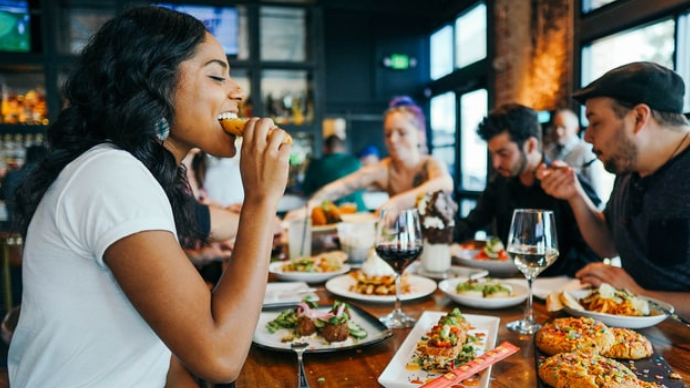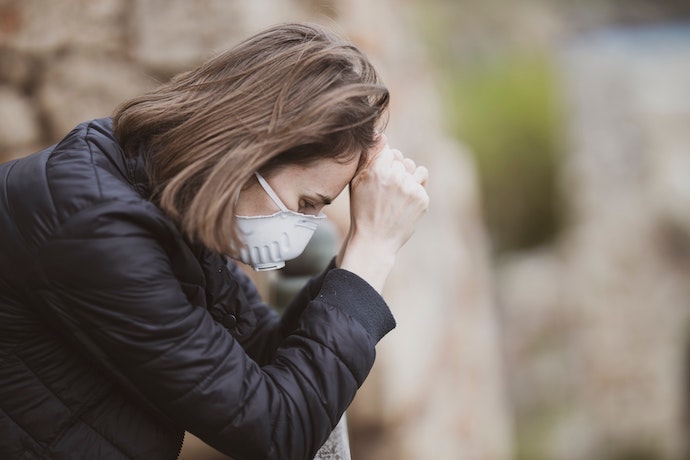As pandemic restrictions ease, an alarming reality emerges. Instead of feeling only relief, many of us feel self-conscious about how our bodies have changed.
We fear having our bodies fully seen, versus our neck-up, dressed-in-sweatpants view on Zoom. We have mixed feelings about returning to fitness spaces, excited to move and socialize but worried about being judged as having “let ourselves go.” We feel anxious about shedding winter layers for springtime shorts and swimsuits. We feel shamed by diet culture messages preying upon our body insecurities.
Overall, we feel defeated by our perfectly imperfect bodies despite surviving a global crisis that turned our routines and our entire lives upside down.
Let’s validate these feelings. It’s been a hard year, and the pandemic isn’t over. Furthermore, let’s acknowledge that it’s always been tough living in our perfectionist body culture, especially if your body no longer fits or never has fit its ideals.
And let’s call out what’s driving these feelings: diet culture, which has warped so many of us into believing that it’s normal and healthy to be obsessed with “fixing” our bodies and to be hypervigilant with food and exercise to attain “health.” Diet culture will continue to flourish unless we take a stand against its toxic “health” messages and transform our collective body shame into a healing opportunity.
How? Let’s resist the urge to apologize for our own bodies or comment on other bodies, remove weight-centric health messages in our community and ditch diet culture’s short-term “fixes” and instead, learn to trust our bodies.
Apologizing for our bodies may be our way of coping, trying to find comfort in an uncomfortable body culture that falsely markets “wellness” as only a thin, “ideal” body size, ignoring body diversity and the complexities of health.
To shift to a body positive culture we can choose not to talk about our bodies at all. Consider communicating with a friend, parent, anybody we’re uncomfortable being seen by. We could say, “Hey, I’m excited to hang out! I wanted to let you know that I’m working on my relationship with food and my body and being valued for more than my body’s appearance. As part of healing from diet culture’s perfectionist body messages, I’d prefer not to talk about either. I’d just love to spend time with you and catch up.”
Boundary setting can protect us from being bombarded by “diet” talk and may plant seeds of curiosity about the non-diet, body positive approach to health.
Let’s also resist the urge to comment on other bodies. We don’t value or love our friends and family members because of how their bodies appear.
Let’s honor each other and how the stress of having our world turned upside down may have affected us. Food and eating challenges are “normal human responses to a global pandemic that do not need to be pathologized or treated as abnormal,” say experts at TraumaAndCo.com.
Consider that weight gain may be restorative for people who have been unnaturally suppressing their weight to comply with diet culture’s definition of health: thinness.
But what about compliments? Let’s say you compliment a co-worker for looking “good,” aka being thin. Weight loss may be due to grief from loss of a loved one, an illness, a divorce, an eating or exercise disorder, from pandemic anxiety or intense stress of any kind. How might this person feel if the weight comes back?
Let’s not feed into and reinforce the myth that all weight gain is bad, that larger bodies are always unhealthy and that smaller bodies are always healthier. Let’s stop assuming somebody’s health status purely by body appearance, period.
♡ For more healthy body image inspiration, listen to my podcast interview on Breaking Body Biases Podcast – Episode 9 – Body Resilience.
Ditch body-centric “health” messaging. Making jokes about pandemic weight gain or weight anytime is not funny, nor is weight-centric “health” messaging motivating.
Weight stigma is discrimination or negative stereotyping of people based on their weight. It’s associated with greater body dissatisfaction, increased risk for depression, anxiety, low self-esteem, disordered eating, disparities in health care, and high allostatic load, the measure of cumulative stress of all body systems. That load puts people at greater risk for Type 2 diabetes, cardiovascular disease, and mortality, researchers say. These researchers also found that stigma caused the opposite of motivation to diet and exercise, actually leading to lower rates of physical activity and greater eater response. It harms people across the body mass index spectrum but with a far greater impact on higher-weight people.
Let’s upgrade our health messaging in our community and take an inclusive, respectful approach to health and support people of all sizes in practicing compassionate self-care and return to body trust.
We were born with the innate ability of knowing how to care for ourselves — listening to and responding to the physical messages coming from within our bodies, known as interoceptive awareness.
Our bodies tell us what they need. Diets teach us not to listen. That foundational problem has led us to tune out and be guided by the “shoulds” and rules of “healthy eating” versus our individual body’s needs.
Consider what a mess diet culture has made of “good nutrition.” Popular diets limit our calories to an amount that’s considered semi-starvation or restrict vegetables by banning bananas and forbidding a russet potato.
Remember that “diet and weight loss have grown to be a $71 billion industry, yet according to studies 95% of diets fail,” according to CNBC.com.
Furthermore, food is more than nutrients. “Food is not good or bad; it is nourishment, whether for the body or soul or both,” says Dr. Sadie Monaghan, a Jackson psychologist. “Go easy on yourself and others, and don’t push weight stigma or food rules during a crisis, or ever.”
What makes you feel nourished, not just with food, but in all aspects of your life? Let’s see each other and our health beyond our body’s appearance. Go easy on yourself and others’ bodies if they changed during the pandemic, or anytime.



